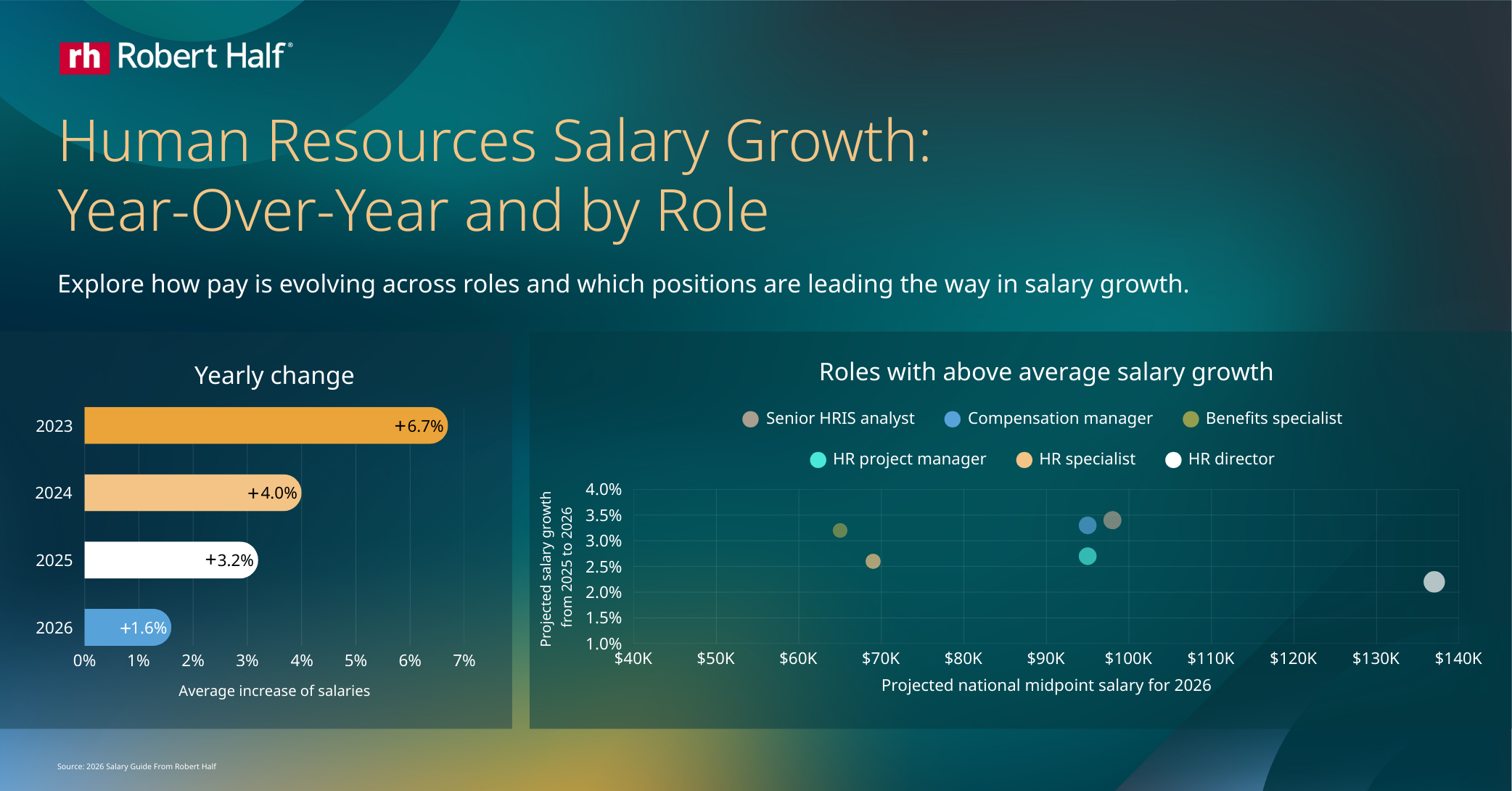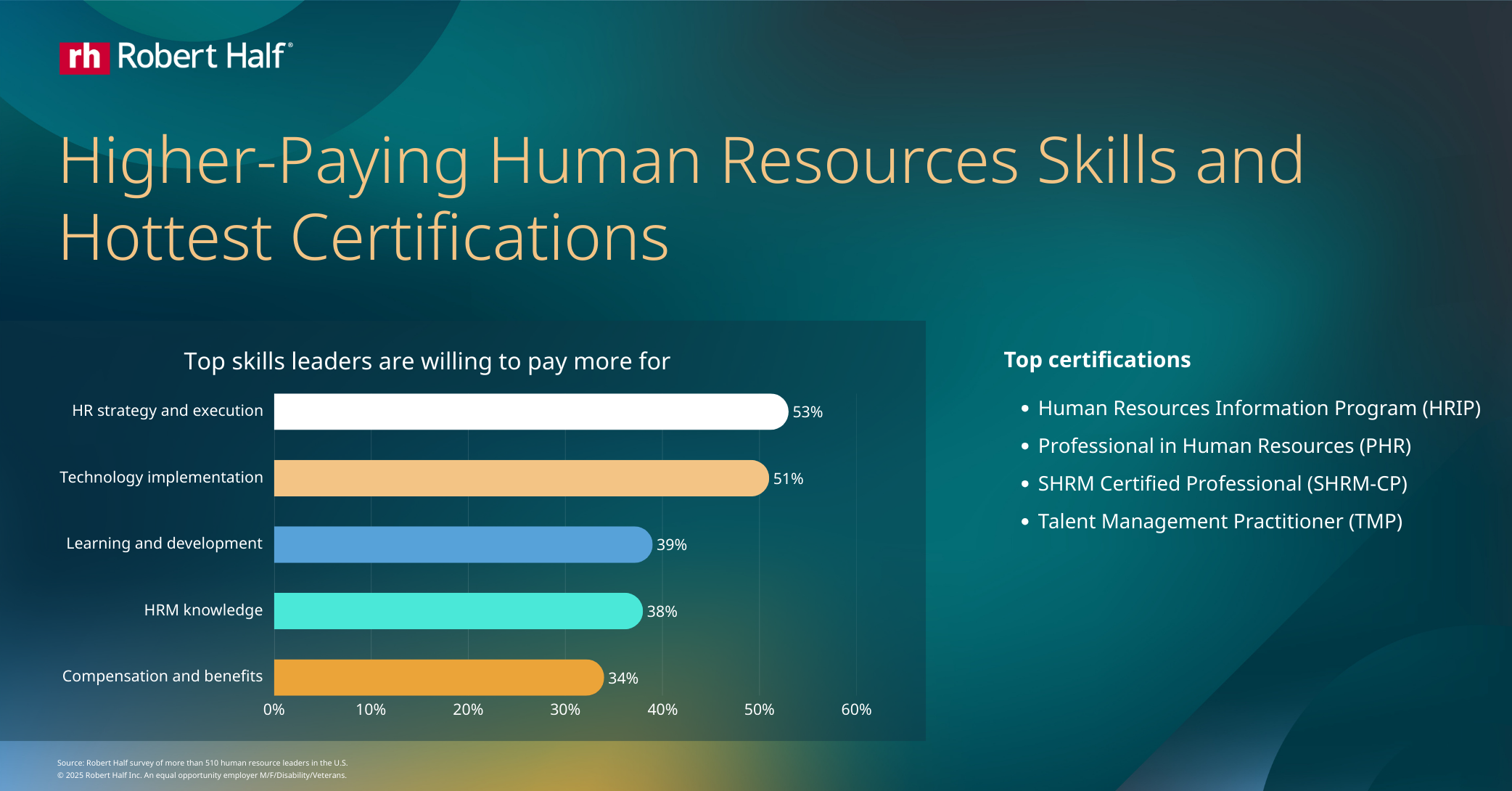Access the Salary Guide
Understanding compensation trends is more important than ever—whether you’re competing for human resources talent or planning your next career move. While overall salary growth has moderated compared with recent years, opportunity remains strong for professionals who combine people-first leadership with strategic, analytical and digital skills.
The 2026 Salary Guide From Robert Half projects that salaries for human resources professionals will rise an average of 1.6% year over year, reflecting steady demand across roles that shape organizational culture, workforce performance and technology transformation. What matters most is not just the percentage increase but where employers are investing in specialized skills—and how professionals can align their career paths to meet that demand.
Human Resources Salaries 2026: Roles and Skills in High Demand
Human resources salary growth in context
Looking back at recent projections shows how the market has evolved—and where new opportunities are emerging. Heading into 2026, salaries are projected to rise 1.6% on average.
While projected growth has slowed, it remains steady and strategic. The strongest projected gains are in HRIS (+2.4%), compensation and benefits (+2.4%) and learning and development (+2.2%), where employers value professionals who combine analytical insight with people strategy and digital fluency.
The market is shifting toward specialization. Professionals who strengthen skills in AI oversight, HR analytics and data-driven workforce strategy will remain in demand as organizations modernize systems and strengthen employee engagement initiatives.
Roles driving higher salaries in human resources
Several positions stand out for above-average projected salary growth in 2026. These roles highlight where employers are willing to pay more and where professionals can build future-ready careers. Today’s HR teams are leading digital transformation, advancing pay transparency, implementing compliance frameworks and supporting hybrid workforce models that prioritize flexibility and well-being. The graphic below shows both the year-over-year salary trends and the HR roles projected to see the strongest growth in 2026.
 Human Resources Salary Growth: Year-Over-Year and by Role
Explore how pay is evolving across roles and which positions are leading the way in salary growth.
Yearly change:
2023: +6.7%
2024: +4.0%
2025: +3.2%
2026: +1.6%
Roles with above-average salary growth (projected growth from 2025 to 2026):
Senior HRIS Analyst – 3.4%, $98,250
Compensation Manager – 3.3%, $95,000
Benefits Specialist – 3.2%, $64,500
HR Project Manager – 2.7%, $94,750
HR Specialist – 2.6%, $69,250
HR Director – 2.2%, $136,750
The scatter plot visualizes each role’s projected salary growth relative to its projected national midpoint salary for 2026.
Source: 2026 Salary Guide from Robert Half.
Human Resources Salary Growth: Year-Over-Year and by Role
Explore how pay is evolving across roles and which positions are leading the way in salary growth.
Yearly change:
2023: +6.7%
2024: +4.0%
2025: +3.2%
2026: +1.6%
Roles with above-average salary growth (projected growth from 2025 to 2026):
Senior HRIS Analyst – 3.4%, $98,250
Compensation Manager – 3.3%, $95,000
Benefits Specialist – 3.2%, $64,500
HR Project Manager – 2.7%, $94,750
HR Specialist – 2.6%, $69,250
HR Director – 2.2%, $136,750
The scatter plot visualizes each role’s projected salary growth relative to its projected national midpoint salary for 2026.
Source: 2026 Salary Guide from Robert Half.
The value of specialized human resources skills
It’s not just the role you hold but the skills you bring to it. According to the 2026 Salary Guide, 86% of HR leaders offer higher pay to candidates with specialized skills compared with those without.
Employers seek HR professionals who can balance people-centered decision-making with analytical insight. Skills in data analytics, workforce planning and AI-driven reporting are helping HR teams make smarter, faster decisions about hiring, retention and employee experience. As HR departments adopt tools that use generative AI and automation to improve workflows, professionals who understand how to leverage technology to enhance communication, streamline processes and personalize learning will see faster pay growth and career advancement.
Certifications that boost earning potential
Certifications continue to help human resources professionals stand out in a competitive job market. Employers view credentials as proof of commitment and technical expertise, while professionals can use them to open doors to higher-paying roles and leadership opportunities.
Encouraging certification programs signals an investment in people, and it’s one of the most effective ways employers can strengthen retention and engagement in a competitive hiring environment. The graphic below highlights the HR skills leaders are most willing to pay more for, along with the certifications expected to hold the greatest value in 2026.
 Higher-Paying Human Resources Skills and Hottest Certifications
Top skills leaders are willing to pay more for:
HR strategy and execution — 53%
Technology implementation — 51%
Learning and development — 39%
HRM knowledge — 38%
Compensation and benefits — 34%
Top certifications:
Human Resources Information Program (HRIP)
Professional in Human Resources (PHR)
SHRM Certified Professional (SHRM-CP)
Talent Management Practitioner (TMP)
Source: Robert Half survey of more than 510 human resource leaders in the U.S.
Higher-Paying Human Resources Skills and Hottest Certifications
Top skills leaders are willing to pay more for:
HR strategy and execution — 53%
Technology implementation — 51%
Learning and development — 39%
HRM knowledge — 38%
Compensation and benefits — 34%
Top certifications:
Human Resources Information Program (HRIP)
Professional in Human Resources (PHR)
SHRM Certified Professional (SHRM-CP)
Talent Management Practitioner (TMP)
Source: Robert Half survey of more than 510 human resource leaders in the U.S.
Industries paying more for human resources skills
Some industries are seeing stronger competition for HR talent, creating salary advantages for professionals who align their expertise with sector-specific needs.
Healthcare: Rapid digitalization and an expanding workforce are driving demand for HR professionals who understand compliance and workforce management.
Financial services: Increasing regulatory complexity and focus on pay equity are boosting salaries for compensation and benefits experts.
Insurance: Growing emphasis on data-driven workforce planning and hybrid operations requires experienced HRIS professionals.
Education: The shift toward skills-based hiring and continuous learning is creating new opportunities in talent development and employee engagement.
Across these sectors, employers value HR professionals who can combine data fluency, empathy and business acumen to support culture, compliance and growth.
Emerging roles in human resources
As AI, analytics and automation continue to shape the workforce, new hybrid HR roles are emerging that blend technology governance, compliance and learning.
AI-Powered Learning and Development Designer: Creates personalized learning paths using AI-driven platforms to support employee growth.
Conversational AI Designer: Develops and manages HR chatbots that improve employee self-service while ensuring accuracy and consistency.
Ethical AI and HR Compliance Officer: Oversees responsible AI use in hiring and performance management, ensuring fairness and regulatory compliance.
These emerging roles are evolving quickly, offering opportunities for professionals who combine HR expertise with technology literacy and a focus on ethical innovation.
Upskilling and contract talent: Building the workforce of the future
With 52% of HR leaders reporting skills gaps within their departments, many are focusing on faster hiring and internal skill-building. To close these gaps, 63% plan to increase their use of contract talent in 2026, especially for training and development, recruitment and compensation projects.
Bringing in contract professionals allows organizations to access specialized expertise on demand while managing costs and timelines. At the same time, upskilling remains essential. Training teams in analytics, compliance and automation tools builds confidence, strengthens culture and prepares employees for new technologies.
Success in 2026 will come from balancing agility with growth, combining the flexibility of contract talent with the long-term value of continuous learning.
Total compensation matters in human resources
Salary is only part of the package. HR professionals consistently rank flexibility as one of their top priorities, and employers are responding by expanding perks and benefits, hybrid options and well-being initiatives.
For employers, this means looking beyond base pay. Many are emphasizing total compensation that includes bonuses, flexible scheduling, professional development and wellness programs. Organizations offering unique perks—such as lifestyle stipends, paid volunteer days or extended parental leave—gain a clear advantage in attracting talent.
For professionals, evaluating total compensation is as important as reviewing salary. A position that offers career growth, meaningful work and hybrid flexibility may provide greater long-term value than one focused on base pay alone.
Opportunities ahead in human resources
Even with moderate salary growth, opportunities in human resources remain strong for 2026. Demand continues to rise for professionals who combine strategic vision, data literacy and people-first leadership.
For employers, success will come from investing in skills that strengthen culture and productivity such as learning technology, HR analytics and AI governance, and from showcasing a clear commitment to flexibility and development.
For professionals, now is the time to pursue certifications, expand digital fluency and build cross-functional expertise. Adaptability will define success in 2026. Those who stay curious, showcase soft skills and embrace innovation will continue to grow, while employers that promote flexibility and continuous learning will be ready for whatever the next workforce evolution brings.
To explore national and local salary data for human resources roles, visit the 2026 Salary Guide From Robert Half.









